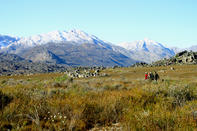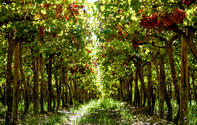Groot Winterhoek Nature
In close proximity to Porterville, lies the Groot Winterhoek Nature Reserve. This rugged and green landscape is popular for its many attractions, namely that of being both a World Heritage Site and a source of clean water for Cape Town. The reserve forms part of the renowned Cape Floral Kingdom and consists of more than 2 285 species of flora, of which several plant species are indigenous to South Africa such as fynbos.

During winter the area is known to be cold and wet, especially at night when temperatures drop below freezing. Which comes as no surprise as to how the reserve got its name as “Groot Winterhoek” which in Afrikaans means “Big Winter Corner”. In summertime, the temperature is more moderate though as inhabitants of the Western Cape will attest to, one should always prepare for a sudden change in temperature.
The reserve is also known for its hiking trails, mountain biking, impressive mountain pools, and for being one of the best paragliding launch sites in South Africa.
Groot Winterhoek Nature Reserve also holds cultural appeal in that ancient rock paintings by the San and Khoi people can be found within the caves and along the rock outcrops of the area. These rock paintings are believed to be between 300 and 6000 years and illustrate social and religious life of the San people whose ancestors lived in Southern Africa for more than 100,000 years.
The Mosaic House
The Mosaic House is a popular attraction in Porterville. Visitors come from far and wide to visit this little gem and meet the mosaic artist Christel Griffiths. Add this to your itinerary when visiting Porterville. The Mosaic House is located at 55 Du Toit Street, Porterville.

Jan Danckaert Museum
Established in 1979, the Jan Danckaert Museum, formerly an old prison exhibits the local history of Porterville. The museum is an example of 19th century architecture, although it was named after the commander of an expedition that was journeying through the area in 1660. Inside which, visitors will find a fascinating collection of antiques ranging from horse-drawn transportation to agricultural tools showcasing the town’s farming legacy. A standout feature of the museum are the replicas of San rock art which serves to encourage visitors’ curiosity of the town’s cultural past as well as play homage to its earlier inhabitants.
Wine Farms

The picturesque town of Porterville is not only home to an impressive wheat production operation, but is also home to prominent wine farms. Forming part of the Swartland Wine Route, wine connoisseurs can enjoy a selection of full-bodied and fortified wines in beautiful settings that span not only the natural wonder of the landscape but the historical buildings as well.
Wine produced in this region is cultivated from vines grown during dryland conditions. While certain vines are irrigated at the end of the summer months. Porterville wines are marked for their excellent quality and are known to include table-top specialities that include white wine and port-style wines.
Disa Uniflora
Porterville attractions are a balanced selection of historic appeal and natural allure. From the Disa Uniflora, a species of orchid, that is commonly red and a rare find in that it mostly occurs on Table Mountain and in other mountainous areas of the Western Cape. While Porterville, is specifically famous for being the home of the rarest Disa Uniflora, the Sulphur yellow disa, which is the only place where the flower can be found.
 Porterville is a quaint town with expansive green fields located along the slopes of the Olifants River Mountain at the base of Voorberg. Th...
Porterville is a quaint town with expansive green fields located along the slopes of the Olifants River Mountain at the base of Voorberg. Th... The West Coast is an easy drive from Cape Town and the Winelands, and all you need do is head onto the N7. Villages such as Paternoster, Lan...
The West Coast is an easy drive from Cape Town and the Winelands, and all you need do is head onto the N7. Villages such as Paternoster, Lan...